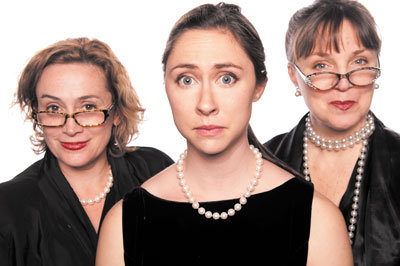The term “Boston marriage” was used in the late 1800s to describe two women who lived together and supported themselves — independent of men.
David Mamet’s play of the same name, presented by 1812 Productions, follows the comical exploits of Anna, Claire and their Scottish maid, Catherine. Anna and Claire share a life together but, in the 19th century, the two have to go through great lengths to make it work. So Anna courts a wealthy older man, while Claire has her loyalty tested by a younger lover. Their affairs set into motion a comedic series of events that threaten their relationship as well as their freedom.
Director Jen Childs said “Boston Marriage” at first might seem like a departure from Mamet’s other works.
“When you go to a Mamet play, you don’t expect to see three ladies in Victorian dresses on stage,” Childs said. “It’s been compared a lot to ‘American Buffalo,’ which is three guys in one room and things are happening in real time. It’s also a piece where desperation hinges on a scheme that goes awry. In many ways, it’s not that different because it does play with that desperation and that need for each other.”
Philadelphia natives Grace Gonglewski and Suzanne O’Donnell play Clarie and Anna, respectively. Both describe the longtime relationship between the two characters as complex.
“It’s all the complexity of marriage and friendship at the same time because they are each others’ biggest cheerleaders but they love each other passionately,” Gonglewski said.
“I think that they are each other’s safe landing place but one of them, Claire, likes to go off and jump on other people’s lily pads, so to speak, and then come back to Emma as a safe haven,” O’Donnell added.
Both actors also said that, despite the unscrupulous plots the two engage in, they see Claire and Anna as sympathetic characters who did what they had to do to make their lives work.
“Their machinations often come out of need. It takes place in the 1890s, when women were trying to get the right to vote,” Gonglewski said. “Women were thought of as second-class citizens. Some of their actions come out of that desperation and that need to make it through. But in general, I think they’re sympathetic and funny and petulant.”
“All of the scheming and efforts that goes on between the two of them comes from the fact that the only way for women to progress in society in that time is to get married, and they don’t want to get married to men,” O’Donnell added. “So they are left living by their wits and living with deception trying to pass in the world as something that they are not.”
Childs said it’s the feelings they have for each other and the lengths they endure to try to stay together that generate the comedic tension in the play.
“There’s a lot of sections where our hearts are breaking and you’re laughing or we’re laughing and your heart is breaking from the truth of it. The more we get to the heart of the story, the funnier it gets. That’s been one of our beliefs from the beginning: that when people are laughing. they are open. They are open to feel things and not shake their finger and scold them. I think it’s easier to feel that heart when you are laughing.”
Gonglewski said that audiences should see the parallels between the story of two women trying to live their lives outside of convention in the 19th century and the continuing struggle for same-sex couples and women in modern-day society.
“It still has reverberations to today,” Gonglewski said. “I also feel like, at the base of it, it’s about one person who is ready to give everything and settle down and the other person is going, “I’m in love with somebody really young and I’d prefer to be with them.” And this somebody young is one in a parade of many young people in this person’s life. I feel like that theme is universal.”
Philadelphia’s 1812 Productions presents “Boston Marriage” through May 20 at Plays & Players Theatre, 1714 Delancey St. For more information or tickets, call 215-592-9560 or visit www.1812productions.org.

